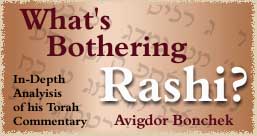

Back to this week's Parsha| Previous Issues
Parashas Beha'aloscha
Last week, Parashas Naso, we left you with a question about a short and puzzling Rashi on Leviticus 5:7 The verses say: "Speak to the Children of Israel: when a man or a woman shall do any of these sins against man to act deceitfully against Hashem and that person incurred guilt (Hebrew: "v'ashmah"). Then they shall confess their sin which they have done and he shall restore that wherein he is guilty together with the principal thereof, and add to it its fifth and give it to whom he is guilty (Hebrew: "l'asher asham lo"). RASHI on the Torah's words: "To whom he is guilty": RASHI: to whom he owes the money." We had asked, what does Rashi tell us that we didn't already know? what's bothering him here? An Answer: The Gur Aryeh suggests that there is a likely misunderstanding here. Verse 6 says "the person who incurred guilt" (the word "ashma" is used) and this refers to being guilty to G-d, as the Torah says just before these words ("acting deceitfully before Hashem"). I might have thought that when the Torah says "he shall restore to whom he is guilty" refers to giving an offering to G-d as atonement. But Rashi clarifies that the word "asham" in this verse does not mean "guilty" it means "obligated to." So while the thief is guilty to G-d he is obligated to make restitution to the man he stole from. The Lesson This may seem obvious, but Rashi is actually clarifying two matters, one linguistic and one moral. The linguistic lesson is that the Hebrew word "asham" can mean either "guilty" or "obligated;" they are not the same. The second matter is morally significant. A man should not feel he can atone for his theft by making "holy" use of the profits. The "Robinhood principle" (stealing from the rich and giving to the poor or to G-d) is not a Torah concept. Now to this week's sedra. Parashas Beha'aloscha Leviticus 10:34 "And the cloud of Hashem was upon them by day when they traveled from the camp."
RASHI says on the words:
What's Bothering Rashi? We will suggest an answer next week.
Back to this week's Parsha | Previous Issues
|